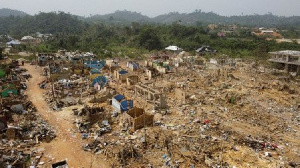Regional News of Friday, 4 February 2022
Source: GNA
EPA discloses outcome of preliminary results on Apiate explosion
Mr Prosper Yaw Nkrumah, Acting Director for Tarkwa Regional Office of the Environmental Protection Agency (EPA), has advised essential workers at the Appiatse explosion site and residents of Appiatse Resettlement Camp to regularly put on their Personal Protective Equipment.
In an interview with the Ghana News Agency, he indicated that results of the preliminary environmental quality assessment conducted by the EPA showed that the general ambient conditions of the Appiatse community may not be too conducive for immediate settlement.
Mr. Nkrumah stressed that "those who have no business in the area should be restricted for now and essential workers from the Municipal Assembly, engineers, security agencies and National Disaster Management Organisation (NADMO) should always wear their Personal Protective Equipment including nose masks.
Also, security personnel deployed to the area should be put on rotational bases to reduce the level of exposure.
According to him, after the incident on January 20, 2022, EPA dispatched environmental quality experts from the Environmental Quality Department of EPA head office to the scene to ascertain the levels and extent of environmental pollution.
According to him, initial investigation by EPA indicated that the truck involved in the explosion was carrying 10 tons of ANFO (Ammonium Nitrate Fuel Oil; a mixture of ammonium nitrate prills plus 10 per cent diesel) which is a “ready to go” explosive used in mining mostly in underground blasting operations.
He said EPA anticipated that there would be significant environmental impact since the whole 10 tons of the explosives were consumed in the explosion, hence the need for environmental quality assessment to determine the extent of pollution.
The pollutants measured included ammonia (in soil and air), SO2, NO2, and respirable dust (PM10 and PM2.5) as well as suspended particulate matter.
The particles, such as "PM10" (Particulate Matter with a diameter of 10 micrograms per cubic metre), he noted, could enter the lungs and cause respiratory diseases. Some respirable dust particles (especially with diameter less than 2.5 micrograms per cubic metre) could be suspended in the ambient air for a long time and could get lodged into the lungs of individuals to further cause respiratory disorders".
He further stated that gases like sulphur dioxide, nitrogen oxides and ammonia gas were generated when ANFO detonates. "The levels of these gases were determined in-situ".
However, water and soil samples were taken to the EPA laboratory in Accra for analysis to determine the threshold levels.
He said, "The preliminary monitoring results indicated elevated ambient air quality results which was not too good. But this cannot be wholly attributed to the explosion since they were in the harmattan period".
Mr. Nkrumah indicated that "the Environmental Quality team is back on the field for further sampling and to expand the area of sampling to validate or otherwise of the preliminary results.
He continued "This is to indicate whether the situation is area-wide or localized. We will go further on the Prestea and Bawdie road so that a comparative analysis could be done".
The EPA Boss said the Dumasi resettlement camp was considered as the best option amongst the alternatives, and water samples were also taken from wells and streams around for laboratory analysis so as not to endanger the lives of the victims.
Mr. Nkrumah entreated the members of the community to observe all the COVID-19 protocols and a high level of environmental sanitation to avoid the outbreak of other communicable diseases like cholera.
He also took the opportunity to advise the victims to obey all the camp rules of the Apiate Emergency Disaster Relief Committee set up by the Municipal Chief Executive of the Prestea Huni-Valley Municipality, Dr Isaac Dasmani.
Entertainment










